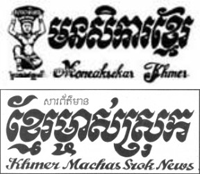By Pen Bona
Radio France Internationale
Translated from Khmer by Komping Puoy
Click here to read the article in Khmer
[I]nformation publication is very important for any political party, overlooking this important issue is a serious political mistake that the opposition should revisit backWhile publications that support the ruling party are flourishing from one year to another, newspapers that support the opposition party keep getting smaller. Currently, there is only one opposition newspaper on sale. It is the Moneaksekar Khmer (Khmer Consciense) which was recently back on print, following a period of suspension. Discrimination from the ruling party is one thing, but the lack of attention from the opposition party itself is another problem.
Among the newspapers that support the ruling party, in particular major newspapers that are published in color and feature several pages in length, there is only one opposition newspaper that can be found on the market currently: the Moneaksekar Khmer newspaper.
Not only is it poor in number, it also lacks resource, quality and professionalism. It is only a black and white newspaper that contains 4 pages, and it depends in a large part on its sale revenue as a source of income. In addition, it also receives some support from opposition officials and MPs.
There are several reasons to explain the lacking of the opposition newspapers:
(1) Discrimination from advertisers: It is true that there are no major businesses that want to advertise in an opposition newspaper because they want to project an image that their businesses are not linked to the opposition party. In Cambodia, projecting an image of coziness to the ruling party or to powerful officials is the favored method used by major businesses to protect their trade. Under this condition, where can the opposition newspaper find its advertising income?
(2) Opposition newspapers are usually discriminated by government officials. This means that reporters for opposition newspapers cannot obtain interviews from government officials, neither by phone or face to face. The problem stems from the fact that government officials do not want to talk to with opposition newspapers because they perceived that the opposition newspapers oppose them all the time, so much so that they hate the opposition newspapers and do not want to talk to them. Therefore, besides speeches or public statements, the opposition cannot receive any official information from government officials.
(3) The lack of attention from the opposition party itself: It is true that the opposition newspapers are discriminated by businesses and the ruling party, but this is not a surprising issue in Cambodia, even though such discriminations should never take place. However, what is most surprising is the lack of attention from the opposition party itself. This is an issue that is hard to understand. Even though they are called opposition newspapers, they received only little support from the opposition, both in terms of funding and moral support.
It is hard to believe when a number of opposition newspaper owners complained that the opposition leaders do not like to talk much with their newspapers because these newspapers are small and not very influential in the society. This creates difficulties for opposition newspapers to obtain words from the opposition leaders and they have to rely on quoting interviews from major newspapers or foreign news media instead. Without such quotes, the opposition newspapers would not have anything much to report about the opposition party that they support.
This situation and climate are the main reasons why opposition newspapers face difficulties and could easily be shut down when they are confronted with lawsuits or financial problems. In conclusion, information publication is very important for any political party, overlooking this important issue is a serious political mistake that the opposition should revisit back.





































